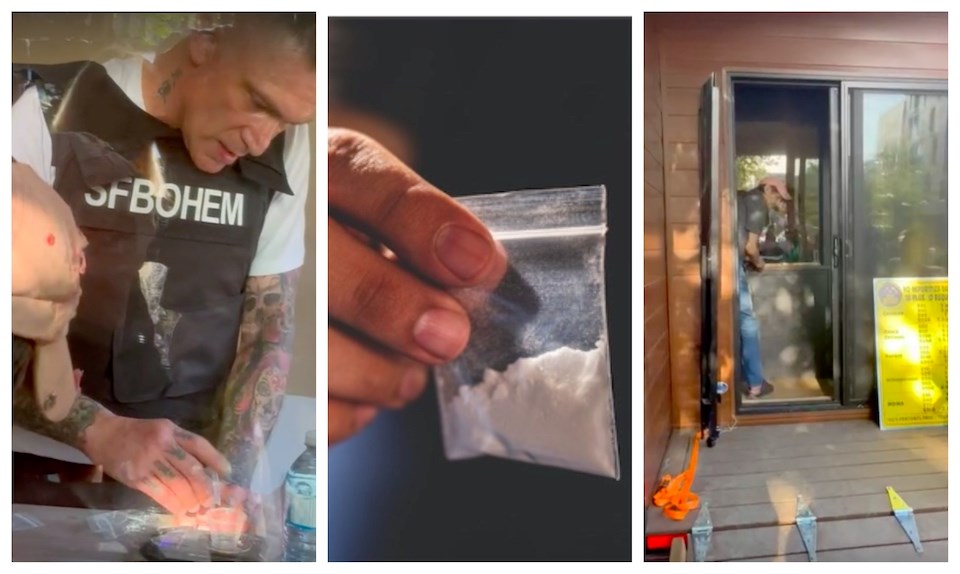A pop-up shop in East Vancouver offers people who use drugs a safe way to access them — but it isn't legal.
Operating out of a mobile shop, aptly named The Drugs Store, owner Jerry Martin sells a range of illicit substances that have been tested to ensure they are free from harmful cuts, such as fentanyl, as well as buffs and adulterants.
After parking his 26-foot camper trailer on Main Street between Hastings and Cordova streets, Martin made his first sale just after 6:30 p.m. on Wednesday (May 3).
But the advocate isn't hoping to make a profit. In fact, he's willing to risk going to jail if it means bringing awareness to an issue that has claimed the lives of his two brothers.
Martin, who has been sober for the better part of 15 years, says he spent about eight years on the street on the Downtown Eastside and knows how dangerous life can be for people who use drugs.
"There's a lot of predators out there. They're making women and other people do things that they don't want to do, whether they've got the money or not...you've got to meet them in an alley," he told V.I.A., adding that many people also get robbed during these exchanges.
Martin's first customer, DTES resident Frank Vragovich, paid $20 for two "points" of "clean" heroin from the pop-up shop, which he said was a great value for something he wouldn't be able to find on the street. Typically, he says he would pay over $100 on the street for the same amount and hasn't been able to get clean heroin for a couple of decades.
While Vragovich knows one person who sells "real heroin" on the street, he noted that it was "terrible" and cut with other substances.
"It might have been three per cent heroin. So I would have had to spend $500 or $600 to feel what I feel from a little bit of this," he told V.I.A., clarifying that he feels ripped off buying off the street.
Instead of buying "street" heroin, Vragovich smokes fentanyl as a substitute. He said he would visit the store again to access clean heroin instead.
After he got home, he planned to "do half [of the bag of heroin]."
Martin said the first day of opening was "very busy" and he plans to set up in the DTES seven days a week during the day and at multiple locations across the city in the evenings.
Customers visit The Drugs Store in the Vancouver DTES
Numerous customers continued to line up into the evening, with several passersby expressing interest, concern, and support for the mobile shop.
The yellow signage at the storefront indicates that the drugs are "tested" and "fentanyl free," with prices based on the amount of a substance purchased. Cocaine prices range between $20 and $$220, crack between $20 and $250, heroin between $25 and $200, methamphetamine between $10 and $100, and MDMA between $10 and $150.
Another DTES resident who we will call Joe* (his name has been changed for safety reasons), says he has lost track of the number of people he knows who have been lost to drugs.
"I did my first cocaine injection when I was 16 years old," the 52-year-old told V.I.A., adding that the first time he tried heroin was when he was incarcerated at age 19.
If heroin was legalized and more stores opened, Joe feels many people's lives would be saved.
"But you can have a non-user who wants to experiment come here and do it," he clarified, adding that he would "never turn anybody on to this monster" who hadn't tried it.
"It's not a gorilla or a monkey. It's a Sasquatch...a very, very big 12-foot Sasquatch that's evil."
The B.C. government decriminalized the possession of small amounts of some illegal substances in January. People may carry up to a total of 2.5 grams of opioids such as heroin and fentanyl, as well as crack and powder cocaine, methamphetamine, and MDMA, also known as ecstasy.
Many critics of the pilot project say the threshold of substances that people may carry is too low and could encourage them to acquire stronger drugs. Others say it targets low-level street dealers who do not profit from the drugs they sell.
Overdose deaths in B.C. increased by over 25 per cent from 2020, with 1,765 deaths in 2020 and 2,224 overdose deaths in 2021.
With files from the Canadian Press



